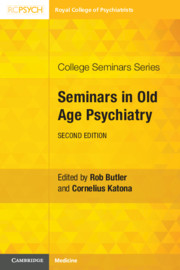Book contents
- Seminars in Old Age Psychiatry
- College Seminars Series
- Seminars in Old Age Psychiatry
- Copyright page
- Contents
- Contributors
- Preface
- Note
- Chapter 1 Healthy Ageing
- Chapter 2 Clinical Assessment
- Chapter 3 Cognitive Assessment
- Chapter 4 Imaging
- Chapter 5 Delirium
- Chapter 6 Alzheimer’s Disease
- Chapter 7 Vascular Dementia
- Chapter 8 Dementia with Lewy Bodies
- Chapter 9 Frontotemporal Dementia
- Chapter 10 Depression
- Chapter 11 Bipolar Disorder
- Chapter 12 Psychosis
- Chapter 13 Anxiety Disorders
- Chapter 14 Drug and Alcohol Misuse
- Chapter 15 Attention Deficit Hyperactivity Disorder
- Chapter 16 Medications
- Chapter 17 Electroconvulsive Therapy and Neurostimulation
- Chapter 18 Psychological Therapies
- Chapter 19 Role of an Old Age Psychiatrist
- Chapter 20 Consultation-Liaison
- Chapter 21 Palliative Care
- Chapter 22 Care Homes
- Chapter 23 Carers
- Chapter 24 Law, Capacity and Ethics
- Chapter 25 Migrants, Refugees and Asylum Seekers
- Chapter 26 Clinical Scenarios
- Index
- References
Chapter 26 - Clinical Scenarios
Published online by Cambridge University Press: 21 June 2019
- Seminars in Old Age Psychiatry
- College Seminars Series
- Seminars in Old Age Psychiatry
- Copyright page
- Contents
- Contributors
- Preface
- Note
- Chapter 1 Healthy Ageing
- Chapter 2 Clinical Assessment
- Chapter 3 Cognitive Assessment
- Chapter 4 Imaging
- Chapter 5 Delirium
- Chapter 6 Alzheimer’s Disease
- Chapter 7 Vascular Dementia
- Chapter 8 Dementia with Lewy Bodies
- Chapter 9 Frontotemporal Dementia
- Chapter 10 Depression
- Chapter 11 Bipolar Disorder
- Chapter 12 Psychosis
- Chapter 13 Anxiety Disorders
- Chapter 14 Drug and Alcohol Misuse
- Chapter 15 Attention Deficit Hyperactivity Disorder
- Chapter 16 Medications
- Chapter 17 Electroconvulsive Therapy and Neurostimulation
- Chapter 18 Psychological Therapies
- Chapter 19 Role of an Old Age Psychiatrist
- Chapter 20 Consultation-Liaison
- Chapter 21 Palliative Care
- Chapter 22 Care Homes
- Chapter 23 Carers
- Chapter 24 Law, Capacity and Ethics
- Chapter 25 Migrants, Refugees and Asylum Seekers
- Chapter 26 Clinical Scenarios
- Index
- References
Summary
In this final chapter we try to bring to life much of the information in previous chapters by describing characteristic clinical cases. These are supplemented by clinical questions and advice relevant to those sitting the Clinical Assessment of Skills and Competencies (CASC) component of the MRCPsych examination. For those readers preparing for examinations we wish you the best of luck.
- Type
- Chapter
- Information
- Seminars in Old Age Psychiatry , pp. 291 - 302Publisher: Cambridge University PressPrint publication year: 2019



